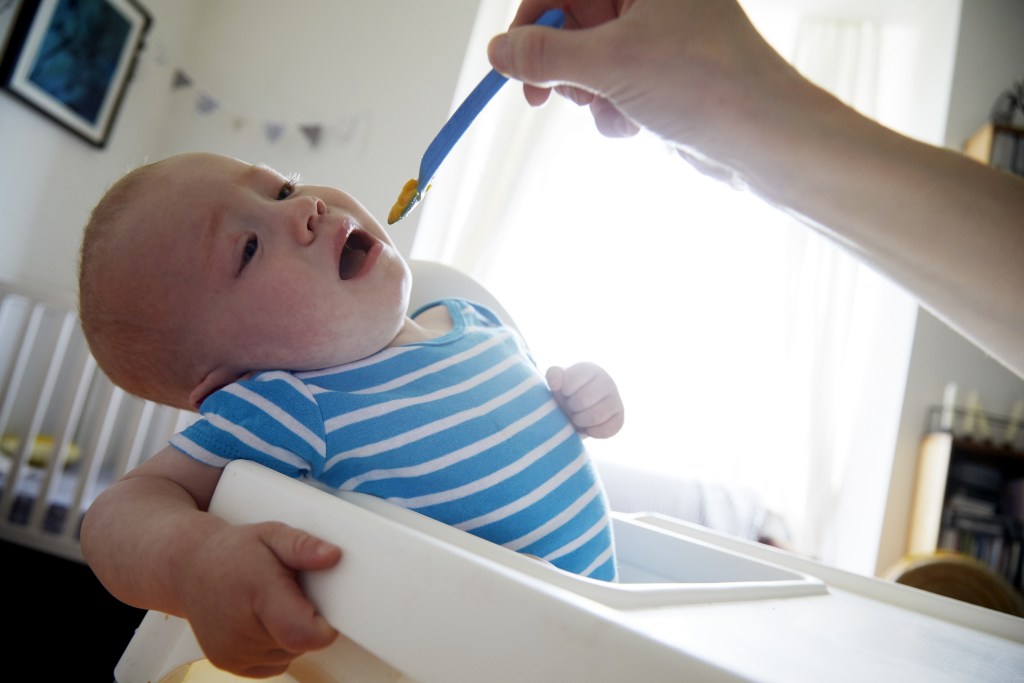Almost every parent knows what it’s like to deal with a toddler who is a picky eater, but dealing with a baby or infant who seems to be particular about what they consume can be worrying for a parent. Being picky about food almost seems like a rite of passage during the toddler years but babies are almost always thrilled when they begin on solid foods, eager to express their likes or dislikes as they try new foods and flavors. While babies may often need to try new foods a few times before they truly enjoy them (we’re looking at you, mushy peas) sometimes there is a real problem that may require feeding therapy.
If you’ve noticed that your baby is struggling to eat and mealtime is becoming more and more stressful, your baby may need feeding therapy. If you’re concerned that your mealtime battles are about more than just picky eating or food aversions and you’re concerned that your baby may not be getting proper nutrition, it may be time to seek professional help. Here are five signs that your baby may need feeding therapy.

What is feeding therapy?
Feeding therapy is when a professional, typically a trained occupational therapist, speech therapist, or pediatric feeding specialist works with a family to get to the root cause of a baby or toddler’s feeding difficulties. They will then come up with specific therapies that will help the baby not only learn to eat better but to enjoy eating. There are some tell-tale signs all parents can be on the lookout for that can tell them if they should be seeking professional help.
Not gaining weight or growing
While a baby’s weight can often fluctuate, not gaining weight or growing, especially after starting solid foods can be a red flag that there may be an issue that could require feeding therapy, according to Intermountain Healthcare.
Feeding behavior
Arching the back while feeding, continually acting fussy at mealtimes, and spitting up or throwing up often while eating or drinking can also be signs that feeding therapy may be needed. “If your child has one of these symptoms or your child is only eating 5 to 10 different foods, is gagging or unable to transition to different textures of food, or mealtime is overly stressful, I would suggest a visit to a feeding therapist,” Intermountain Healthcare pediatric speech-language pathologist Kimberly Hirte explained.
Difficulties sucking and swallowing
RWJ Barnabas Health warns that abnormal sucking or swallowing can be a sign your baby may need feeding therapy. This can often mean that the baby is having trouble coordinating their sucking and swallowing with their breathing, which can result in not only poor feeding but labored breathing while they try to eat.

Lengthy mealtimes
Most parents have experienced some mealtimes that last longer than most, but Abilities in Action warns that mealtimes that consistently last longer than 30 minutes and/or are a struggle can be a warning sign.
Refuses to try new foods
If your baby refuses to try new foods or often pushes food away, it may be a sign your baby needs feeding therapy, notes Children’s Health Orange County (CHOC).
What does a food therapist do?
Food therapists can work with you and your baby to help them develop the skills needed to eat and drink properly. They can help babies learn to breathe while sucking from a bottle or drinking from a cup as well as help older babies who are transitioning to solid foods learn how to chew properly and feed themselves. “Pediatric feeding therapists are specially trained to help assess your child’s chewing skills and if they are moving their tongue correctly,” Hirte added. “We can teach them to strengthen the muscles in their mouth and help them move their tongue effectively.”
She also noted that for babies who have aversions to different textures, “therapists can help to make feeding time more enjoyable by changing food textures, liquid thickness, feeding positions or methods and can also offer suggestions to improve behavior during eating.”
What can parents do?
It can be incredibly stressful for a parent or caregiver of a baby who is struggling with eating and drinking. While we assume that the ability to eat and drink normally should come naturally, that simply isn’t always the case. A food therapist will not only work with your baby but will also help teach parents and caregivers the tools they need to help outside of therapy. A food therapist will work as a team with parents and caregivers to ensure the baby gets all the support and help they need to help improve their feeding habits.
According to CHOC, feeding therapists will teach parents and caregivers feeding strategies and provide general advice for eating at home, tactics for addressing negative mealtime behaviors, how to continue encouraging the child to eat the new foods introduced during therapy at home, and how to keep a food log of what the child eats and how he or she acts at mealtime and reacts to foods.
Feeding difficulties are more common than many may think. According to one source, 25 percent of all children will experience feeding difficulties during infancy and early childhood and if left untreated these feeding difficulties can affect their overall health and development. If you’re concerned your baby may be experiencing issues feeding speak to your doctor and see if an evaluation by a feeding therapist may help.



